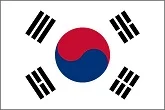Agriculture, forestry, and fishing, value added | South Korea – yearly data, chart and table
Loading...
Compare
Including forestry and fisheries.
Primary data
Change
Per month
Per capita
Per person employed in agriculture
Per 1000 km2 surface area
PPP
In constant 2015 dollars
In local currency (average annual exchange rate)
Per capita (local currency)
Percent of GDP
Table
Chart
Loading...
Loading...
Overview
The total agriculture, forestry, and fishing value added of South Korea in 2023 amounted to 27 329.42 million USD, which is 0.547% less than in 2022, when it was 27 479.80 million USD. It has been falling in this country for already 2 years in a row. Over the entire data period, since 1960, this indicator has increased in 18.87 times. The lowest value added in agriculture was recorded in 1961, when it was 935.15 million USD. The maximum value of South Korea was in 2021, when it reached 33 743.99 million USD. Agriculture, forestry, and fishing corresponds to ISIC (Rev. 4) divisions 01-03 and includes the exploitation of vegetal and animal natural resources, comprising the activities of growing of crops, raising and breeding of animals, harvesting of timber and other plants, animals or animal products from a farm or their natural habitats.Value added is the contribution to the economy by a producer or an industry or an institutional sector, which is estimated by the total value of output produced and deducting the total value of intermediate consumption of goods and services used to produce that output.
Additional infomation:
About indicator
Agriculture, forestry, and fishing corresponds to ISIC divisions 1-3 and includes forestry, hunting, and fishing, as well as cultivation of crops and livestock production. Value added is the net output of a sector after adding up all outputs and subtracting intermediate inputs. It is calculated without making deductions for depreciation of fabricated assets or depletion and degradation of natural resources. The origin of value added is determined by the International Standard Industrial Classification (ISIC), revision 4.




